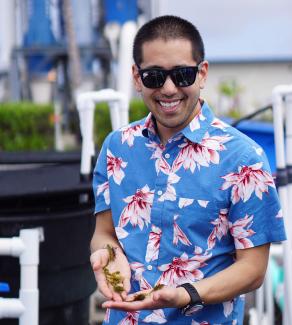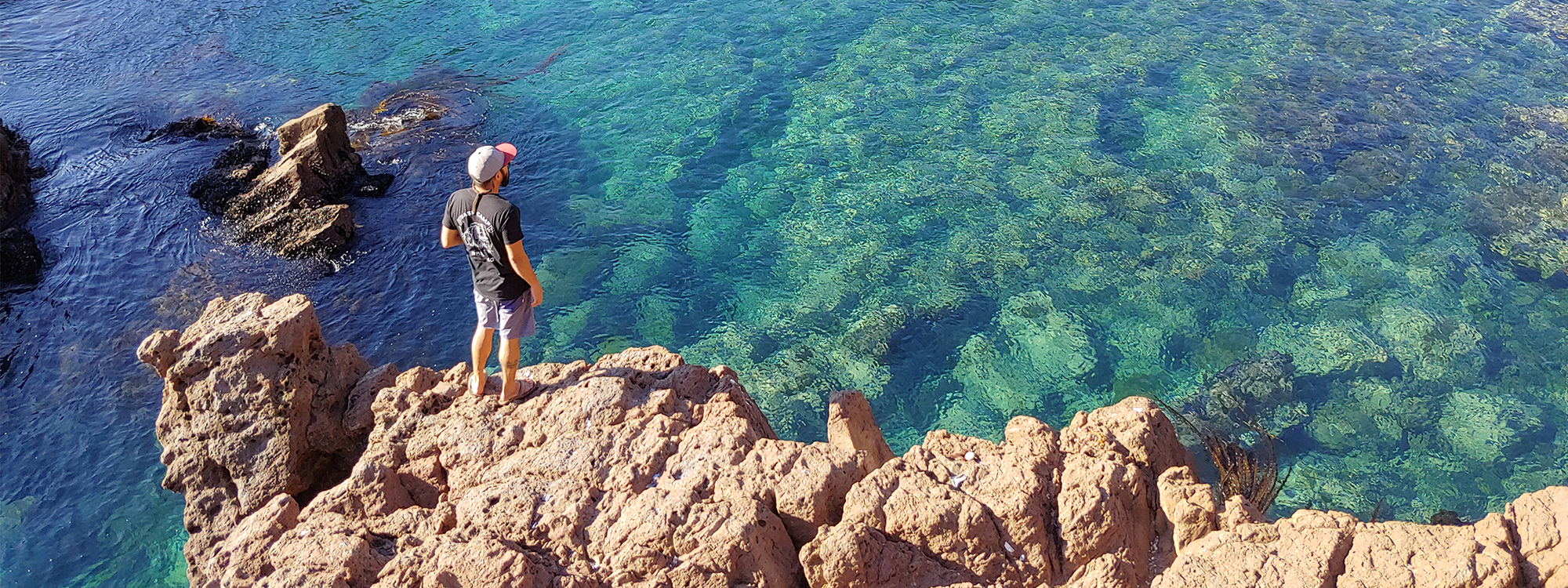Hired even before he walked at graduation, today Garrett Goto (MESM ‘19) is an Aquaculture Manager for the Center for Oceans at Conservation International. Based in Arlington, Virginia, Garrett is helping to develop and implement the global aquaculture strategy for CI, which includes projects to reduce the environmental impacts of shrimp aquaculture, and adapting financial tools to encourage responsible practices.
“It’s fast-paced and I’m working on a lot of projects. The people here are like-minded and inspiring,” says Garrett, whose journey to a meaningful career in aquaculture and sustainable food systems started with a class he took while an undergraduate at UC Santa Barbara.
Garrett Goto was raised in the community of Marin County, across the Golden Gate Bridge from San Francisco, and headed south to UCSB for college. Going in undeclared, he found his niche after taking a course called Oil & Water. “We learned how petroleum and energy use are interlinked with water consumption as global resources.”

With his interest now piqued, he pursued a major in hydrologic science and policy, an interdisciplinary study that combined the physical and social sciences with biology and chemistry. “It was a workload that prepared me for the environmental hydrology field, and it later turned out to be an excellent primer for Bren.”
But Garrett didn’t go straight into grad school after earning his bachelor of science. “I took six years and, looking back, I think it was really important for me to gain work experience, to collaborate with people in other professions.” He took contract jobs for a time, then, “I came across an opportunity in sustainable agriculture with a small company. They produced a plant-based product that replaces antibiotic growth promoters in animal feed.”
Through this job, which was largely based in Southeast Asia, “I learned a lot about food production processes; how we get our food. Food production is intrinsically linked to the environment, and as long as there are people eating, there will be environmental problems to be solved.” Some of the challenges, he learned, were bigger than the food processing part of the picture. “We ran into corruption and difficulty selling in areas driven by greed, not necessarily the health of people or the environment.”
Having gained valuable insights and experience with this company, Garrett took stock of his goals. “I knew I wanted to go to grad school, and I started to look at programs that were interdisciplinary, not necessarily a conventional master’s of science route."
I was interested in aquaculture and that’s what led me to Bren. I spoke with a lot of people -- colleagues, friends, and friends of friends. And Bren kept coming up.
Instead of choosing between the group project track and the Eco-Entrepreneurial track, in which students produce a business plan as the final deliverable, Garrett chose both. “I got my degree with the group project, but I also wanted to take the entrepreneur classes to complement the master’s degree.”
His group project aligned with his interests: Based in Baja, California, it dealt with the complex interactions of growing a protected species in aquaculture. “The totoaba is an endangered fish in the Gulf of Mexico that’s susceptible to poaching because the fish’s swim bladder is highly valued in China. We wanted to see if aquaculture could meet market demand and reduce the incentives for poachers.” Two of the five members of this group, along with another Bren colleague, also worked together on the Eco-E venture, testing the viability of a novel feed additive for finfish aquaculture.
In support of that project, Garrett was awarded the 2018 Eco-Entrepreneurship Summer Internship Fellowship. The recipients are selected from the first-year MESM class through an essay and application process overseen by the Eco-E Program Committee at Bren. He used the funding during the summer between his first and second year to conduct an aquaculture feed trial at NOAA’s Northwest Fisheries Science Center in Seattle, Washington.
“I was definitely busy,” he says, and it paid off. At Conservation International, he is inspired by the daunting challenges of feeding the world in sustainable ways. “Our connection to food-production systems has always been interesting to me – where food comes from, how it’s made, traceability, the impact that food production has on the environment, the social aspects of food. Solving the problems of feeding a global population combines social sciences and hard sciences.”
To this end, “One of the most valuable things I learned at Bren is the importance of accurate communication of science. Producing accurate results, then translating information into actual guidelines, making it accessible so that people understand what they can do to protect the environment.”
He’s also learned the importance of making connections. “Networking is so important, and it’s a skill that Bren emphasizes really well. The Eco-E program in particular emphasized it in that first quarter."
“Now others have been reaching out to me – people who are calling to ask about Bren.” His advice to future Bren students is to “go into Bren with an idea of what you want your career to look like, not your ideal job. Your experience at Bren will change your outlook on what you want to be doing and what your priorities are – it’s a fluid learning experience.”
